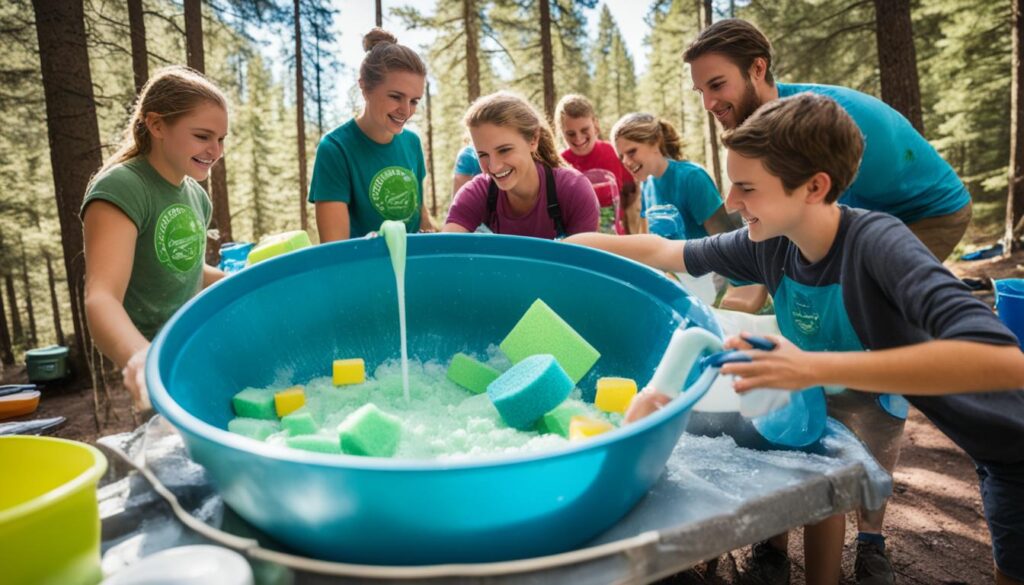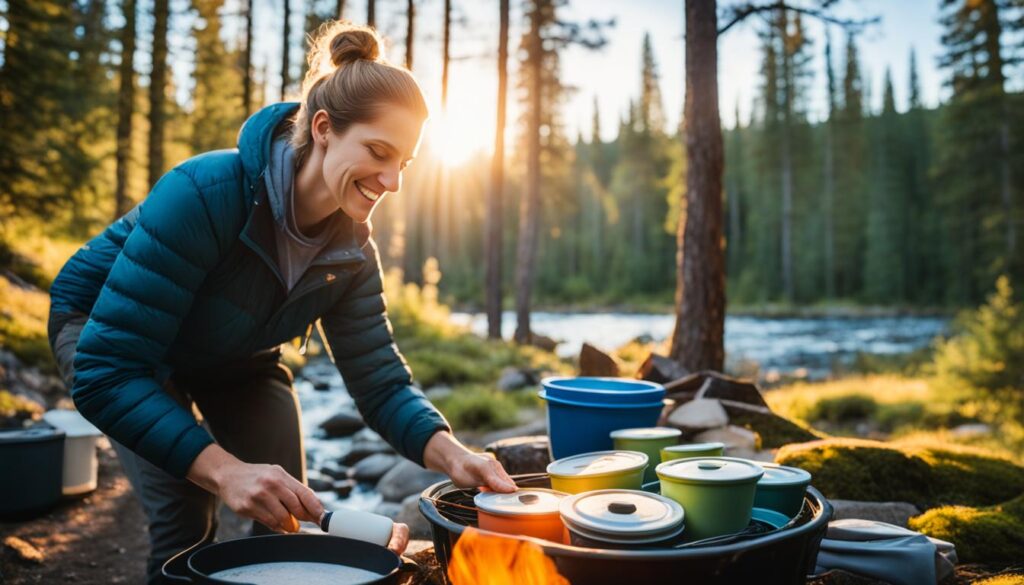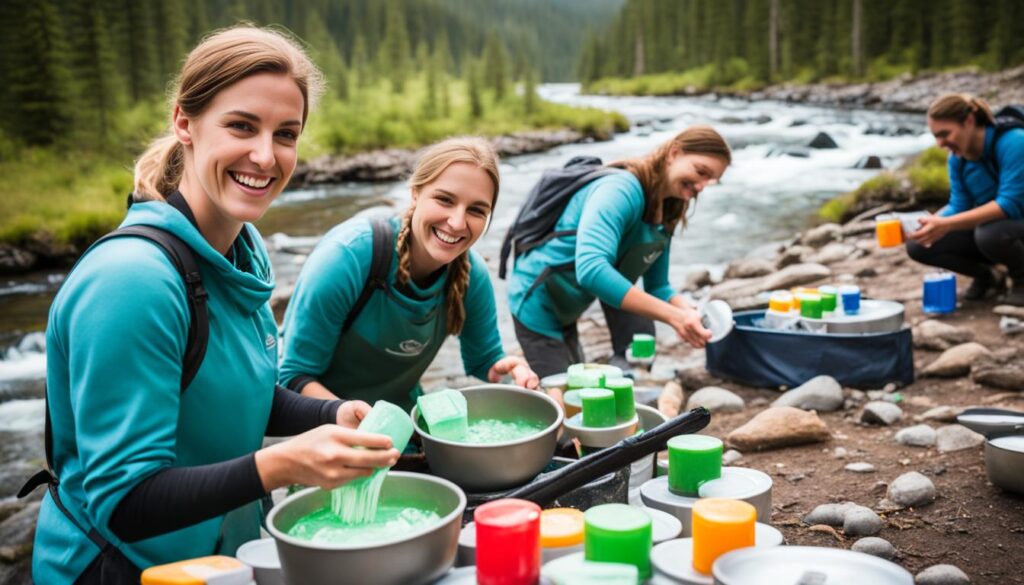Washing dishes while camping can be a challenge without access to a dishwasher or sink. However, with the right techniques and equipment, it is possible to wash dishes while camping and minimize your impact on the environment. In this guide, I will provide you with step-by-step instructions on how to wash dishes when camping in an eco-friendly manner.
Key Takeaways:
- Washing dishes while camping can be done in an eco-friendly way.
- Proper equipment and soap alternatives are essential for a successful camping dishwashing experience.
- Dispose of graywater responsibly, following Leave No Trace guidelines.
- Effective communication and assigning responsibilities can make the dishwashing process smoother and more efficient.
- By following these tips, you can preserve nature and enjoy your camping trip.
The Basics of Washing Dishes at a Campground
When camping at a developed campground, it is ideal to use the designated dishwashing facilities, if available. However, not all campgrounds have these amenities, requiring campers to wash their dishes at their campsite. To ensure a smooth and hassle-free experience, it’s important to be prepared with the necessary equipment and follow proper hygiene practices.
First and foremost, it’s crucial to avoid washing dishes in the bathroom sink or at drinking water spigots. These areas are meant for personal hygiene and drinking water purposes, and using them for dishwashing can attract pests and compromise hygiene standards. Instead, set up a dedicated dishwashing station at your campsite.
Setting up Your Camping Dishwashing Station
Here are the essential camping kitchen essentials you’ll need to set up an efficient dishwashing station:
- A large basin or bucket: This will serve as your primary dishwashing sink.
- Biodegradable camp soap: Opt for environmentally-friendly soap that won’t harm the surrounding nature.
- A sponge or scrub brush: Used for scrubbing dishes clean.
- A collapsible drying rack: Essential for air drying dishes after washing.
By having these camping kitchen essentials readily available, you’ll be able to maintain cleanliness and hygiene while minimizing your impact on the environment.
Responsible Disposal of Dishwater
Properly disposing of dishwater is crucial to protect the environment and follow camping etiquette. When it comes to campsite dishwashing, it is important to follow Leave No Trace principles:
- Strain food particles out of the dishwater using a mesh strainer or cheesecloth.
- Scatter the strained dishwater at least 200 feet away from any water sources, including rivers, lakes, and streams. This ensures that any leftover soap or food particles do not contaminate the water.
- Do not dump dishwater on vegetation, as it can harm plants and disrupt the ecosystem.
Following these responsible dishwater disposal guidelines will help protect the environment and preserve the beauty of the campground for future generations of campers.
Now that you know how to set up a camping dishwashing station and responsibly dispose of dishwater, you’ll be well-prepared to maintain cleanliness and hygiene while enjoying your camping adventure.

Step-by-Step Guide: How to Wash Dishes While Camping
To wash dishes while camping, follow these step-by-step instructions:
-
Gather Your Camping Dishwashing Equipment:
Before you begin, make sure you have all the necessary supplies:
- A basin or plastic tub
- Biodegradable camp soap
- A sponge or scrub brush
- A large pot for boiling water
- A collapsible drying rack
- Disposable gloves (optional)
-
Scrape Off Excess Food:
Prior to washing, use a scraper or brush to remove any leftover food debris from the dishes. This will make the cleaning process easier and prevent clogging your campsite’s plumbing. Dispose of the food scraps in a trash bag or designated compost bin.
-
Prepare Your Dishwashing Station:
Set up your dishwashing station in a convenient and sanitary location. Place the basin or plastic tub on a stable surface, such as a picnic table or camping kitchen countertop. Fill it with warm water and add a small amount of biodegradable camp soap.
Pro tip: Position your dishwashing station at least 200 feet away from any water source, such as a river or lake, to prevent contamination.
-
Wash and Rinse:
Place the dirty dishes in the soapy water and use a sponge or scrub brush to thoroughly clean each item. Scrub away any grease, stains, or residue. Rinse the dishes with clean water to remove any soap residue.
Note: If you’re conserving water, you can reuse the soapy water for multiple rounds of dishwashing before replacing it.
-
Sanitize (Optional):
If desired, sanitize the dishes by immersing them in a solution of 1 tablespoon of bleach per gallon of water for at least one minute. Rinse the dishes with clean water to remove any bleach residue.
-
Air Dry:
Allow the dishes to air dry on a collapsible drying rack or clean towel. Avoid using disposable paper towels to reduce waste.
-
Properly Dispose of Graywater:
Graywater is the used dishwashing water containing food particles and soap. To protect the environment, strain out any food particles from the graywater, then disperse it at least 200 feet away from water sources or dig a small hole and bury it.
Following these steps will ensure that you can effectively wash dishes while camping, keeping your campsite clean and minimizing your impact on the environment.
Quick Camping Dishwashing Hacks:
“An easy way to save water while camping is to use separate basins for washing and rinsing. This way, you can reuse the rinse water for multiple batches of dishes, conserving precious water resources.” – Outdoors Enthusiast Magazine
| Benefit | Effective Dishwashing Tips |
|---|---|
| Save Water | Use separate basins for washing and rinsing. Reuse rinse water for multiple batches of dishes. |
| Minimize Waste | Scrape off excess food before washing. Avoid disposable paper towels and opt for reusable dishcloths or towels. |
| Ensure Sanitation | Add a small amount of bleach to the final rinse water for extra sanitization. |
| Streamline Cleanup | Assign dishwashing duties to different individuals each day to distribute the workload. |
The Easy Way to Clean Camping Dishes
To make the dishwashing process easier while camping, I recommend being prepared with a few essential camping kitchen essentials. These items will ensure that your outdoor dishwashing experience is efficient and hassle-free.
Firstly, it’s important to have a large pot for boiling water. This will come in handy for sterilizing utensils and killing any bacteria that may be present on your dishes.
A basin or plastic tub is also essential for creating the perfect outdoor dishwashing station. This will serve as your sink where you can soak, scrub, and rinse your dishes.
Investing in a biodegradable camp soap is not only environmentally friendly but also helpful for effective cleaning. Look for a soap that is specifically designed for camping and safe for the environment.
For scrubbing off stubborn food particles, I recommend using a sponge or scrub brush. These tools will make quick work of any grime or residue on your dishes.
To dry your dishes, a collapsible drying rack is a must-have. This convenient accessory can be easily packed and set up wherever you are camping. It allows your dishes to air dry naturally, minimizing the need for additional towels or paper products.

Remember to scrape off excess food particles before soaking your dishes. This will simplify the cleaning process and prevent clogging your camping kitchen essentials.
When it comes to cleaning, use hot water and your biodegradable camp soap. This combination will help to break down grease and effectively remove any dirt or stains.
Consider using environmentally-friendly soap alternatives as well. There are many options available on the market that are specifically formulated to minimize harm to the environment.
Lastly, allow your dishes to air dry. In the outdoor environment, dishes typically dry quickly, especially in sunny or windy conditions. Be sure to choose a location where they will be undisturbed while drying.
When disposing of graywater, it’s essential to be mindful of the environment. Follow guidelines set forth by Leave No Trace principles for proper disposal.
Dishwashing the Eco-Friendly Way
When it comes to washing dishes while camping, it’s crucial to consider the environmental impact and choose soap and bleach alternatives that minimize harm to nature. Fortunately, there are numerous eco-friendly options available that can help you maintain good hygiene without causing harm.
One of the best choices for camping dishwashing is biodegradable dish soap. These soaps are specially formulated to break down easily in the environment, minimizing pollution. Look for brands like Dr. Bronner’s or Campsuds, which offer biodegradable options suitable for camping.
Similarly, when it comes to bleach alternatives, opt for chlorine-free options. Traditional bleach can be harmful to aquatic life when disposed of improperly. Look for eco-friendly bleach alternatives like hydrogen peroxide or vinegar, which are equally effective and safer for the environment.
Another important aspect of eco-friendly dishwashing is to set up your camp kitchen in an organized manner. By doing so, you can minimize waste and prevent food particles from contaminating the environment. Use designated containers for food scraps and make sure to dispose of them properly in designated waste bins.
Furthermore, be mindful of where you dispose of graywater, following the principles of the Leave No Trace guidelines. Graywater refers to the wastewater generated from dishwashing. It’s important to avoid dumping graywater directly into water sources, such as rivers or lakes, as it can contaminate the ecosystem. Instead, dispose of graywater into a suitable location at least 200 feet away from any water source.
To summarize, adopting eco-friendly practices when washing dishes while camping is essential for preserving the environment. Opt for biodegradable dish soap and chlorine-free bleach alternatives to minimize pollution. Keep your camp kitchen organized to reduce waste, and dispose of graywater responsibly, following Leave No Trace guidelines. By implementing these camping hygiene tips, you can enjoy a clean campsite while minimizing your impact on nature.
Camping Hygiene Tips:
- Choose biodegradable dish soap
- Opt for chlorine-free bleach alternatives
- Set up a well-organized camp kitchen to reduce waste
- Dispose of graywater responsibly, away from water sources
Comparison of Popular Eco-Friendly Dish Soaps
| Brand | Biodegradable | Fragrance-Free | Size |
|---|---|---|---|
| Dr. Bronner’s | Yes | Yes | 16 oz |
| Campsuds | Yes | No | 8 oz |
| Seventh Generation | Yes | Yes | 25 oz |
| Ecover | Yes | Yes | 32 oz |

Communication and Responsibility in Doing Dishes
When camping with a group, effective communication and assigning responsibilities are key to making the dishwashing process smoother and more eco-friendly. By distributing the workload and encouraging everyone to wash and sanitize their own personal dishes, you can ensure that no one person is burdened with all the work. Assigning dish duty for each night in advance can help rotate responsibilities and prevent any one individual from being responsible every night. To make the chore more enjoyable, consider implementing fun ways to determine who’s on dish duty, such as playing a game or rotating responsibilities.
“Assigning dish duty for each night in advance can help rotate responsibilities and prevent any one individual from being responsible every night.”
It is crucial to ensure that everyone in the group understands the importance of proper dishwashing and disposing of graywater responsibly. By educating everyone about campsite hygiene and sharing camping dishwashing tips, you can maintain a clean and healthy camp kitchen. Emphasize the significance of using environmentally-friendly soap alternatives and follow Leave No Trace guidelines to minimize the impact on the environment.
Sample Dish Duty Schedule
| Day | Person Responsible |
|---|---|
| Day 1 | John |
| Day 2 | Sarah |
| Day 3 | Michael |
| Day 4 | Emily |
| Day 5 | David |
By implementing a dish duty schedule like the sample above, everyone in the group can contribute to keeping the camp kitchen clean, fostering a sense of teamwork and responsibility.
Conclusion
Washing dishes while camping can seem like a daunting task, but with the right approach, you can make it a breeze. By following these camping dishwashing tips and using eco-friendly practices, you can minimize your impact on the environment and enjoy your outdoor adventures to the fullest.
First and foremost, it is essential to equip yourself with the right tools and soap alternatives. Make sure to pack a large pot for boiling water, a basin or plastic tub, biodegradable camp soap, a sponge or scrub brush, and a collapsible drying rack. These essentials will make the dishwashing process much easier and more efficient.
Additionally, responsible disposal of graywater is crucial to preserve nature. Always be mindful of where you dispose of dishwater and follow Leave No Trace guidelines. Choosing biodegradable soap options will further minimize harm to the environment.
Lastly, effective communication and assigning responsibilities within your group play a vital role in keeping the camp kitchen clean. Encourage everyone to wash and sanitize their own dishes, rotate dish duty, and emphasize the importance of proper dishwashing and responsible graywater disposal.
With these camping dishwashing tips in mind, you can become a master in no time. So go ahead and enjoy your camping trip while leaving nothing more than footprints behind.
FAQ
Can I wash dishes at a campground without designated facilities?
Yes, if the campground doesn’t have designated dishwashing facilities, you can wash dishes at your campsite. Just be sure to follow proper dishwashing and graywater disposal guidelines.
What equipment do I need to wash dishes while camping?
To wash dishes while camping, you will need a large pot for boiling water, a basin or plastic tub, biodegradable camp soap, a sponge or scrub brush, and a collapsible drying rack.
Should I scrape off excess food before washing dishes?
Yes, it’s important to scrape off excess food before soaking dishes. This helps prevent clogging your sink or contaminating the graywater.
Can I use environmentally-friendly soap alternatives for dishwashing?
Yes, there are many environmentally-friendly soap alternatives available, such as biodegradable dish soaps and chlorine-free bleach alternatives. These options minimize harm to the environment.
How long does it take for dishes to air dry when camping?
Dishes can air dry in a short amount of time when camping, depending on the weather conditions. However, using a collapsible drying rack can speed up the drying process.
What should I do with the graywater from dishwashing?
It’s important to dispose of graywater responsibly while camping. Follow Leave No Trace guidelines and avoid disposing of graywater near rivers, lakes, or other bodies of water. Instead, dispose of it in a designated graywater disposal area or scatter it at least 200 feet away from any water source.
How can I make dish duty easier when camping with a group?
When camping with a group, assign responsibilities and encourage everyone to wash and sanitize their own personal dishes. Rotate dish duty among group members to distribute the workload and consider fun ways to determine who’s on dish duty each night.
How can I ensure proper communication and responsibility in doing dishes while camping?
Effective communication is key when doing dishes while camping. Assign dish duty in advance, ensure everyone understands the importance of proper dishwashing and graywater disposal, and encourage a team effort in keeping the camp kitchen clean.

